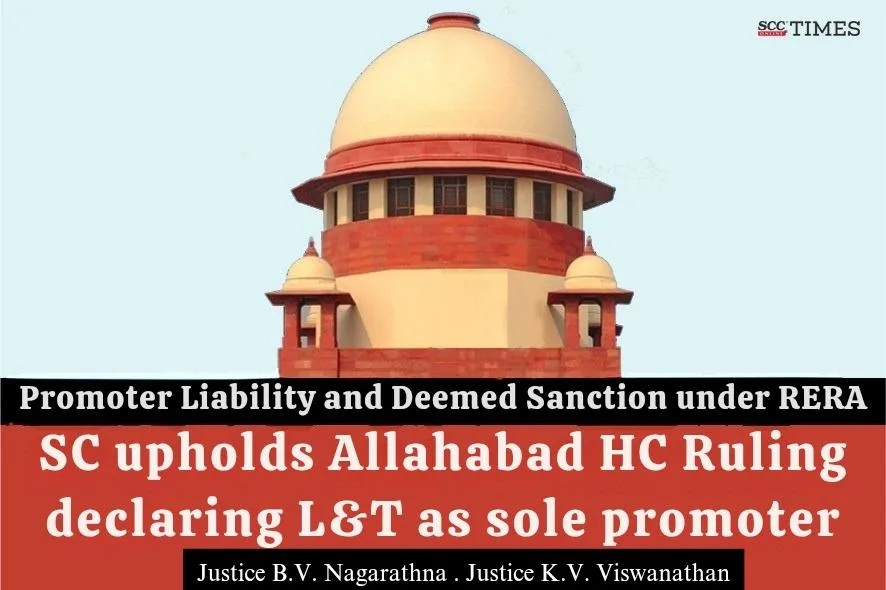Supreme Court: In a Special Leave Petition filed by the Uttar Pradesh Real Estate Regulatory Authority (‘UPRERA’) challenging the order of the Allahabad High Court dated 01-10-2024, wherein it was held that Larsen & Toubro (‘L&T’), being the developer, qualified as a promoter under the Act, and that the landowner was not required to be added as a co-promoter for the purpose of project registration. It further observed that, since UPRERA failed to decide the registration application within the prescribed period of 30 days, the project would be deemed to have been registered under Section 5(2) of the Real Estate (Regulation and Development) Act, 2016 (‘the Act’). A division bench of B.V. Nagarathna and K.V. Viswanathan, JJ. after examining the facts and circumstances of the case, noted that the agreements and correspondence on record, including various letters from the landowner, clearly indicated that L&T was solely responsible for the construction, sale, and marketing of the project. On that basis, the Court found no reason to interfere with the deemed sanction declared by the High Court.
However, the Court clarified that the interpretation of deemed sanction under Section 5(2) and the definition of promoter under Section 2(zk) remain open issues. The observations made by the Allahabad High Court were held to be confined to the specific facts of this case and shall not be treated as binding precedent.
The Court noted that the concerns expressed by UPRERA related, firstly, to the definition of the expression ‘promoter’ under clause (zk) of Section 2 of the Real Estate (Regulation and Development) Act, 2016 (‘RERA Act’). This term had been interpreted by the High Court in the impugned order in a particular manner. UPRERA submitted that, given the broad definition provided in the Act, the restrictive interpretation adopted by the High Court in its judgment may not have been correct. Secondly, UPRERA submitted that the prayer and relief granted regarding the deemed sanction of the project were wholly unwarranted.
The Court said that, in the present case, L&T could not have legitimately sought such a prayer in the writ petition, which was initially filed to challenge the notice dated 08-05-2024 issued by UPRERA. Under the guise of challenging that notice, L&T had sought additional reliefs which, according to UPRERA, ought not to have been entertained by the High Court.
Upon considering the facts and circumstances of the case, including the Assignment Agreement dated 31-07-2017, the Special Power of Attorney granted to L&T, and three other documents dated 09-06-2023, 20-07-2023, and 18-10-2023, the Court held that the concerns raised by UPRERA had been adequately addressed. Accordingly, the deemed sanction granted by the High Court did not warrant interference.
However, the Court left open UPRERA’s submissions regarding the interpretation of Section 2(zk) of the Act (concerning the definition of promoter) and Section 5(2) (regarding the circumstances under which a deemed sanction may be recognized) to be considered in an appropriate future case. The Court clarified that it did not endorse the reasoning provided by the High Court in this matter on those aspects.
The Court observed that, insofar as the first and foremost argument of UPRERA, regarding the entertainability of the writ petition filed by L&T, was concerned, the High Court had exercised its discretion under Article 226 of the Constitution of India to entertain and hear the writ petition on merits. It had done so in an elaborate manner and delivered a detailed judgment.
In light of this, the Court held that it would not be just and proper, at this stage, to re-examine the issue of maintainability of the writ petition in the present case. Accordingly, the Court found that this contention did not warrant any interference.
Hence, the Court made it clear that, as far as the interpretation of Section 2(zk) and Section 5(2) by the High Court in paragraph 164 of its judgment was concerned, it was expressing no opinion, and that issue was left open for fresh consideration in a suitable case.
The Court reiterated that the observations made by the High Court in paragraph 164 of the impugned judgment were confined to the facts of the present case and should not be construed as having any binding precedent.
In view of the aforesaid discussion, the Court directed UPRERA to comply with the directions issued by the High Court under Section 5(2) of the Act within a period of three weeks from the date of the order.
The Special Leave Petition was accordingly disposed of in the above terms.
[Uttar Pradesh Real Estate Regulatory Authority v Larsen and Toubro Limited, 2025 SCC OnLine SC 1750, decided on 13-08-2025]
Advocates who appeared in this case:
For Petitioner(s): Mr. Shyam Divan, Sr. Adv., Mr. Arunabh Chowdhary, Sr. Adv., Mr. Sarvesh Singh Baghel, AOR, Mr. Yashvardhan Singh, Adv., Mr. Aniruddha Mahadevan Sethi, Adv.
For Respondent(s): Dr. Abhishek Manu Singhvi, Sr. Adv., Mr. Gopal Subramanium, Sr. Adv., Mr. Raunak Dhillon, Adv., Mr. Indranil Deshmukh, Adv., Ms. Saloni Kapadia, Adv., Ms. Gauri Subramanium, Adv., Mr. Avishkar Singhvi, Adv., Ms. Aishwarya Gupta, Adv., Mr. Karan Gandhi, Adv., Mr. Anchit Jasuja, Adv., Mr. Yash Johri, Adv., Mr. Pawan Bhushan, Adv., Mr. Raghav Kohli, Adv., Ms. Sakshi Raman, Adv., M/S. Cyril Amarchand Mangaldas , AOR, Mr. Shashank Shekhar Singh, AOR, Mr. Abhinav Singh, Adv., Mr. Sudarshan Lamba, AOR, Ms. Aishwarya Bhati, A.S.G., Mr. Madhav Singhal, Adv., Mr. Suyash Pandey, Adv., Mr. Chitrangda Rashtravara, Adv., Mr. Vaishnav Kirti Singh, Adv.Mr. Jagdish Chandra, Adv.



